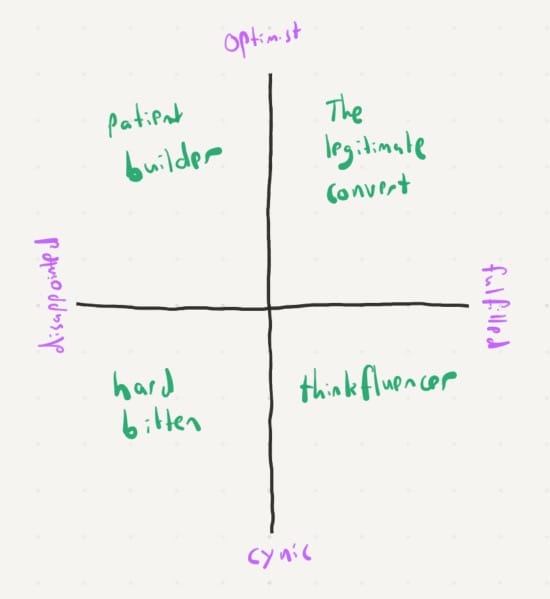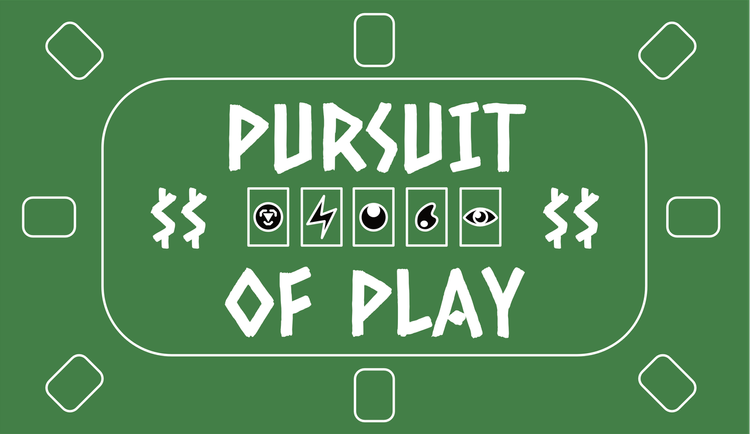A (belated) reflection on the AI hype cycle

My first hype cycle
I remember sitting in my father’s office on campus at Ohio State University listening to the discordant pings & tones that I would soon learn to associate with the concept of connection. It was my first time connecting to the internet - on a 14.4kbps dial up modem no less - and it felt like some kind of miracle. I was 12 years old, and we’d had a home PC for as long as I could remember, but this was something different. Everything before had been programs, and - yes - I look back fondly on many of them decades later, the Carmen Sandiegos and Number Munchers and Oregon Trails of my childhood. This, though, this felt alive. Because it was university internet, it wan’t mediated by the polished portals of the Compuservs and America Onlines…it was just the open internet with all its rough edges, with the frustrations of getting booted off because of some interruption to the connection, with half completed pages and frequent “Under Construction” jpegs. It was bulletin boards and FTP. That first time, I don’t think I even used a search engine; my father had one of those old school calendars where you tore off a page each day, and this one had 1 website every day. Many of them didn’t even have domain names, just DNS entries; many of them didn’t exist anymore in April on a calendar that had been published in December. It was rough, but it was beautiful, and it captured my imagination immediately. Within a few weeks of that first time, I started to learn HTML and was building my own websites.
This was the precipice of the internet hype cycle. Within a couple years it seemed like everyone was online and mainstream media was saturated with stories about how the internet would transform our lives with utopian dreams about new social structures.
The thing is…of all the hype cycles to bite your teeth on, this might have been the best example of reality living up to the hype. Not without some significant road bumps along the way. The utopian dreams faded a bit as the impulse to monetize emerged, and then the ecommerce bubble burst a
Dissecting the hype cycle
I suspect that susceptibility to hype cycles is in large part a function of the experience of one’s first hype cycle. There was an incredible run for about 2 decades from the mid 80s with the rise of the personal computer until the arrival of the iphone in 2007, with the internet wedged in between. There were some misstarts in there - pity the poor people whose first hype cycle was ecommerce - but that trifecta of increasingly personal, increasingly networked computing that connected the world legitimately did change the world, for better and for worse and in ways that are still playing out. Like, to the point that this whole sentiment is actually pretty cliche. We all know it.
What is the effect of being on the front edge of one of those legitimately transformative hype cycles? I can imagine a few:
- You might be predisposed to believe and trust the new hype cycles.
- If you are an optimist, you might be inclined to even seek out the next big thing that could achieve that same kind of transformation to be involved in developing it in some way.
- If you are a cynic, you might also seek out that next thing in order to be on the bleeding edge in decrying its potential impact.
Of course, there are also the hype cycles where the source of the hype either didn’t pan out; that generally doesn’t mean that the source was a total non-start, just that it was incapable of living up to the hype before the hype died out. The societal changed tend to have a longer tail and a less profound impact. The quantified self was really hypy 10-15 years ago; nowadays people wear fitness tracking devices…but if they all disappeared suddenly from the face of the earth, not much would change [1].
If you were on the front edge of one of these hype cycles:
- You might be predisposed towards skepticism.
- If you are an optimist, you might become a vocal advocate of the long game - a patient builder who is both more cautious with risk but more committed.
- If you are a cynic, then you would want to play the shortest game - get in early as the hype is building and try to identify the peak of the hype so you can exit then.
Fittingly, hype cycles are created and sustained by these 4 types:

- The optimistic legitimate convert who experienced a genuine transformation looks for what’s next and wants to put their energy behind it (whether in labor or capital). They provide the spark.
- The hard bitten cynic wants join in and vocally advocate for whatever that new thing is, regardless of what they think of its actual potential. They feed the hype where they’ve taken an early position. They pour gasoline on the flame.
- The thinkfluencer cynic waits until the hype is starting to really build before they start to identify and articulate all of the ways that the source of the hype are going to cause harm. Ironically, this actually feeds the hype cycle even more. If the hype cycle is a grease fire, they pour water on it.
- The patient builder optimist joins in just before the hype starts to reach its fever pitch and develop whatever bit of the hype actually has real application [2]. This also feeds the hype cycle, because it makes the hype more tangible to the average person. Sticking with the fire analogy, they provide a steady supply of fuel.
Of course, not every hype cycle runs the same. Some burn really hot and flame out fast. Some stay low and slow. As a general rule of thumb, I consider how much physical hardware is necessary for the hype source; the more there is, the longer it will take the hype cycle to run its course. I also think this explains a lot of the hype cycle fatigue that we can feel, because in the post-internet, post-cloud era, there’s a lot of purely software hype cycles. Medical records anyone? MOOCs? NFTs? I don’t want to say that pure software plays are easy, but compared to things like green energy, they move a whole lot faster.
Of course this had to be about AI
When he was selected first overall in the 1996 NBA draft, there was a sense in the basketball world that Allen Ezail Iverson marked the dawn of a new day in basketball. While Jordan’s Bulls were still dominant, you didn’t need a degree in advanced mathematics to know that they were on the decline. It was an open question among basketball fans of who would be the next Jordan, and AI was the Answer. He was a one man offensive machine who could dominate the game like no one else of his generation…or at least such was the thought at the time.
AI never won an NBA championship. He won scoring titles, sure. He even won an MVP award. But the only time he ever reached the finals, his team lost pretty soundly to a team with a young star who was selected in the same draft and ultimately inherited the mantle of Jordan - Kobe Bean Bryant [3]
What prevented him from living up to the hype? In retrospect, some of it was staring us right in the face the whole time:
- AI was unpredictable. Did he sometimes stay out at a craps table until 4am on the night before a game? I’ll let him speak here: "You think I'm going to come to Miami from freezing Philly and not go out? I know how to take care of my body. I'm not a little kid. I go out and come in when I want to." You just never knew what AI might say.
- AI sometimes ran afoul of the law. There were incidents with weapons, domestic violence, and more. AI created some thorny legal issues for the institutions he was a part of to deal with.
- AI was inefficient. As a player, he had a historically high usage rate. He scored a lot, but he also needed the ball in his hands a lot to get there. Sure, AI could do some impressive things, but he needed a lot of resources to make them happen.
- AI’s training had unexpected limitations. Are we talking about practice? Yes, indeed we are. In Iverson’s case, it was his noted resistance to it - though, of course, not the game! But, realistically, even for the best players there are limits to how much they can improve through practice.[4]
- AI couldn’t do everything! At one point, he released a rap single…it was, um, not good. He was notorious for losing large amount of money in Atlantic City casinos. It’s just unfair to expect that because someone or something is great in one area, that they’ll be great in all areas.[5]
- AI couldn’t even do everything… on the court. This was less his fault and more about the expectations thrust on him. Make no doubt, he was an exceptional scorer but the fact that the Sixers organization could never put a team around him that could make the most of that incredible ability is tragic. Expecting AI to be a magical solution to every problem was just absurd.
But that doesn’t mean the hype was totally empty. AI did indeed change the game, just in unexpected ways.
- AI really did usher in a new era. Go back and rewatch the Last Dance, and note that supercool NBA superstar Michael Jordan is listening to smooth jazz on the team bus. AI wasn’t solely responsible for connecting the NBA & hip hop, but at the very least he solidified the relationship and ensured it was here to stay. During the course of his career, the NBA went from a very buttoned up, conservative approach to its players to one that was more open and expressive.
- AI paved the way for how to build around weaknesses and limitations. While he never got to benefit from this revelation, it’s hard to imagine that a team like the Warriors would have known what to do with a generational talent like Steph Curry had they not seen how Philadelphia mishandled AI. Realistically, AI needed some safeguards in order to bring out his best.
I feel like I could go on ad infinitum - we haven’t discussed his disastrous turn on the Olympic team or his post-playing career turn to the cannabis industry.
The thing is, AI is so multi-dimensional and nuanced that it’s hard to reduce this to simple lessons and pat takeaways. In fact, it’s entirely possible that the story of AI is still being written and that nothing will ever come along that makes us associate those two letters with anything other than the one and only Allen Iverson.
- For the record, I suspect this is also the story of crypto.
- Ideally only with their labor, because this is the worst time to play the long game with capital.
- Yes, Bean really was Kobe’s middle name. I promise this is true. Click on the wikipedia link if you don’t believe me.
- On the other hand, Kobe Bean Bryan was a noted gym rat who may have single handedly saved USA Basketball in 2008 when everyone saw how hard he worked out and practiced.
- Another shoutout to Oscar winner Kobe Bean Bryant. You didn’t know Kobe won an Oscar? For real, he did.





Member discussion